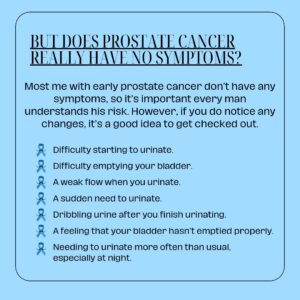Prostate Cancer – the ins and outs.
You may have heard some conflicting information about prostate cancer screening. What kind of test is it? Do I really need it? Generally, the first step in screening for prostate cancer is a prostate specific antigen (PSA) test, in which a small amount of blood is drawn from the arm and the level of PSA, a protein made by the prostate, is measured. To start with, it probably helps if we tell you what the prostate actually is…
What is the prostate?
The prostate is a gland. It is usually the size and shape of a walnut and grows bigger as you get older. It sits underneath the bladder and surrounds the urethra, which is the tube that carries urine (wee) out of the body. The prostate’s main job is to help make semen – the fluid that carries sperm.
Are you at risk?
Your age, ethnicity and family history all play a role in your likelihood of getting prostate cancer in your lifetime. 1 in 8 men get prostate cancer. Together, we’re supporting our dads, brothers, partners and friends by raising awareness and helping to reduce late diagnosis by offering PSA blood testing.

Signs and Symptoms
Most men with early prostate cancer don’t have any signs or symptoms. That’s why it’s important to know about your risk. We can test your Prostate Specific Antigen (PSA) through a blood test and your results will be available within just a few days.

but… does Prostate Cancer really have no symptoms?

If you are a male and aged over 45 we would recommend you get a PSA blood test, even if you are experiencing no symptoms. However, if you do experience any worrying symptoms – it’s always best to get them checked out, by us or your GP/practice nurse!
What does a PSA blood test involve?
The PSA test is a blood test that measures the amount of prostate specific antigen (PSA) in your blood. PSA is a protein produced by normal cells in the prostate and also by prostate cancer cells. It’s normal to have a small amount of PSA in your blood, and the amount rises slightly as you get older and your prostate gets bigger. A raised PSA level may suggest you have a problem with your prostate, but not necessarily cancer.
Prostate specific antigen (PSA) is produced by healthy cells in the prostate, so it’s normal to have a small amount of PSA in your blood. The amount rises as you get older because your prostate gets bigger.
Lots of things can affect your PSA level too, including the following.
- A urine infection – You may have a test for a urine infection as this can raise your PSA level. If you have an infection, you’ll be given treatment for this. You’ll need to wait until the infection has gone – around six weeks – before you have a PSA test.
- Vigorous exercise – You might be asked not to do any vigorous exercise in the 48 hours before a PSA test.
- Ejaculation – You may be asked to avoid any sexual activity that leads to ejaculation in the 48 hours before a PSA test.
- Anal sex and prostate stimulation – Receiving anal sex, or having your prostate stimulated during sex, might raise your PSA level for a while. It might be worth avoiding this for a week before a PSA test.
- Prostate biopsy – If you’ve had a biopsy in the six weeks before a PSA test, this could raise your PSA level.
- Medicines – Some medicines might affect your PSA levels.
- Other tests or surgery – If you’ve had any tests or surgery on your bladder or prostate, you may need to wait up to six weeks before having a PSA test.
- Urinary catheters – If you have a catheter to drain urine from your bladder, you may need to wait up to six weeks after it has been put in before having a PSA test.
It’s natural to feel worried or embarrassed about going to the doctor or having tests. But don’t let that stop you!
Remember, the tests give us the best idea about whether you have a problem that needs treating.
If you or someone you know is worried about their prostate or simply has never had it checked, contact us and we will be happy to help you.